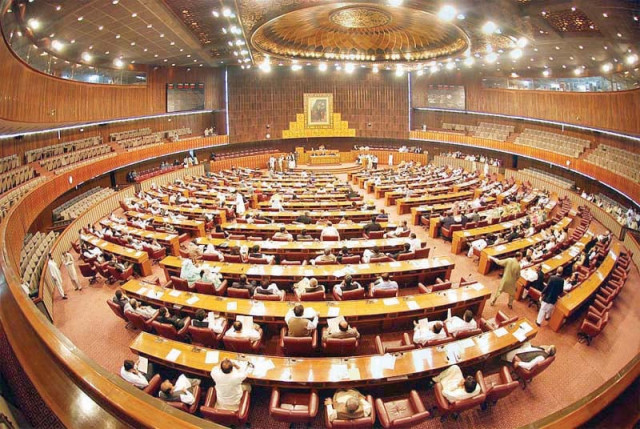Permanent disqualification under 63-A is nothing but a hoax
What 63-A protects is not the seat but a member’s conscience

Article 63-A covers and regulates the entire event of voting contrary to party directions in a vote of no confidence motion. Such a vote constitutes “defection”, it states and prescribes a maximum punishment of de-seating a member in question. The quantum of the penalty and so also the manner in which it is to be imposed is also expressly prescribed therein.
The language used in 63-A being plain and unambiguous doesn’t pose any difficulty in ascertaining the intent of the legislature, i.e., if a member decides to vote in terms of his own conscience and violates party directives he should be prepared for the consequence of losing his own seat.
Can a penalty higher then what is expressly prescribed in 63-A be imposed by the Election Comission of Pakistan? A lifetime disqualification or a declaration to operate retrospectively by cancelling the vote already casted are excessive penalties which are not prescribed under article 63-A. To read in penalties not specifically provided for,would be tantamount to reading words in the constitution, which, it is well settled, can not be done. If any such penalty were to be imposed it would be without jurisdiction and ultra vires article 63-A.
You can’t be the leader of a house, the majority of which wants you out. It is admitted that you can always vote against your own PM and that is without any consequence. Voting against the party directions however is what gets you into trouble but how much trouble? is what is being debated.
The constitution (63-A) specifically regulates this situation and provides a maximum punishment which is to de-seat a member in the event he has exercised his vote against party directions. Why Shouldnt he also be disqualified for life and why shouldnt such a vote (albeit already casted by him) be declared illegal? argues the government, which seeks to advance its case purportedly on moral grounds. In support of its argument, it further canvasses that textual and literal meaning of article 63-A should be avoided and a broader interpretation be adopted.
The government views such an exercise (voting against party directions) to be an ultimate test of righteousness. In other words, if you vote against your own party directions you would no longer remain Sadiq and Ameen and thus ought to be disqualified for life. It appears that the Government has all together failed to comprehend the wisdom of the legislature and the underlying spirit embodied in Article 63-A.
What if the party head itself were to indulge in an illegal and immoral activity and decided to sell some of the votes? Whilst all the elected members (after their scrutiny) are certified Sadiq and Ameens, a party head doesn’t necessarily have to fulfill such a requirement.
Hence theoretically speaking, the odds of a party head indulging in an immoral activity are higher then an elected member. Let’s assume party A which has 50 MNA’s designates Mr.X to contest for PM’s position. Halfway down the road, the party head realises that there’s no chance Mr.X can win the election, why not sell some of the votes to collect some funds for the next elections for his party.
He directs some of the MNA’s to vote for party B instead. Must the members sell their votes without question as and when pleased by the party head and if they didn’t should they be disqualified for life or should they rather have the freedom to listen to their conscience even if it is at the cost of loosing their own seat? The answer lies in 63-A which unambiguously guarantees and ensures that a member remains righteous, sagacious, non profligate, honest and ameen; even at the cost of loosing his own seat.
Read More: Petition seeking PM’s disqualification filed in BHC
What 63-A protects is not the seat but a member’s conscience. Every member is free to exercise his vote in terms of his conscience even if the party head directs him otherwise. Selling your vote unquestionably earns you a disqualification for life but such a finding can only be given by a court of law after a factual enquiry. Voting against your own PM or against party directions does not ipso facto establish that you have sold your vote on the contrary you can very well be acting righteously when refusing to follow party directions for instance by refusing to sell your vote notwithstanding directions to the contrary from the party head.
To say that you must blindly follow party head’s directions even if it warrants compromising your own conscience or else you will be disqualified for life makes a mockery of the entire scheme of the constitution. The question is simple. If a certified Sadiq and ameen member listens to his conscience by refusing to sell his/her vote even if directed by the party head, should he be disqualified for life Or should his seat become vacant as prescribed under article 63-A? The answer is also quite simple, If he is to be disqualified for life for being righteous why would the constitution want him to be righteous in the first place?
A permanent disqualification under 63-A is quite far fetched-legally speaking and is nothing but a hoax, politically however it’s a smart move on part of the government. Many a members may return home fearing that they might permanently be disqualified under 63-A. Later when the Apex court opines the obvious by ruling out permanent disqualification, those suppressing their conscience may realize the gimmick well played by the government.
AUTHOR IS ADVOCATE SUPREME COURT OF PAKISTAN



















COMMENTS
Comments are moderated and generally will be posted if they are on-topic and not abusive.
For more information, please see our Comments FAQ